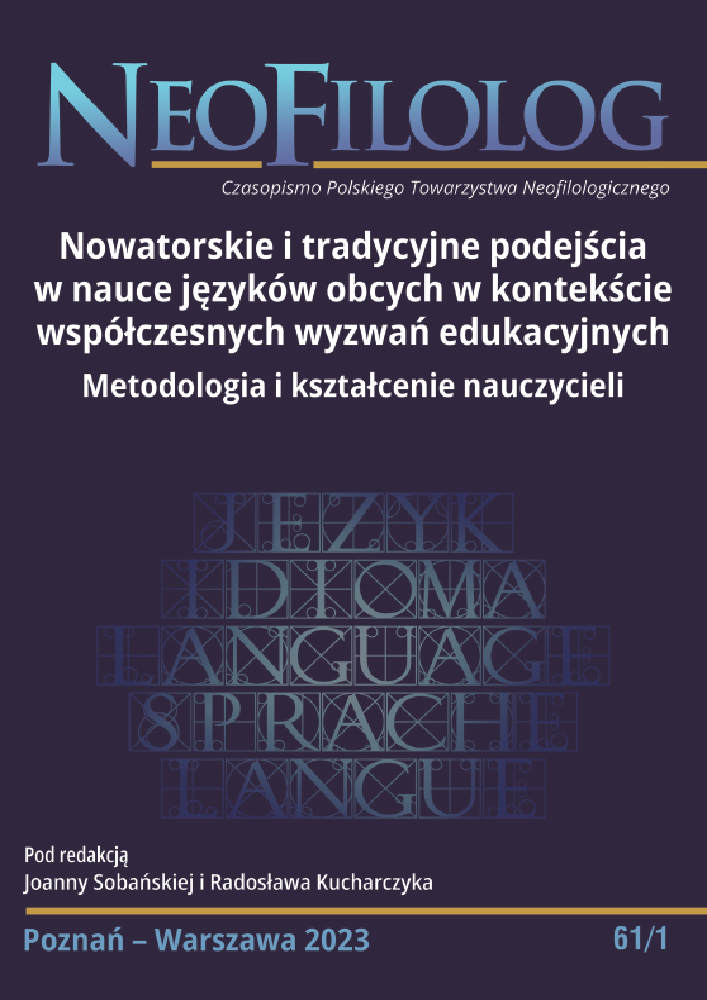Résumé
While studies on interpretative repertoires have been conducted in SLA, this is still a fairly new topic with regard to language teachers. Due to various contextual differences, teachers’ interpretative repertoires change, which also seems a sufficient reason why they should be investigated on a regular basis. The aim of this study is to identify and analyse Polish in-service teachers’ (n=48) interpretative repertoires concerning language which emerged in the teachers’ discourses in the context of their taking a promotion examination. Acknowledging the complexity of this issue, interpretative repertoires, including the SLA studies devoted to identifying them, are first discussed, followed by a description of the study. In terms of methodology, the author’s field notes for data collection were used. The data were coded following the content analysis approach, and 6 conceptualizations of language emerged: language as system, language as communication, language as culture, but also as translanguaging, as preparation for exam, and as life preparation. The findings can be used to adopt new directions in future research on Polish teachers’ language-based interpretative repertoires. The study may also provide information for school policies and practice.
Références
Adamson M. (2014), Reflexivity and the construction of competing discourses of masculinity in a female-dominated profession. “Gender, Work and Organization”, Vol. 2, No 6, pp. 559–572. DOI: https://doi.org/10.1111/gwao.12058
Barkhuizen G. (2010), An extended positioning analysis of a pre-service teacher’s better life small story. “Applied Linguistics”, Vol. 31, No 2, pp. 282–300. DOI: https://doi.org/10.1093/applin/amp027
Edley N. (2003), Analysing masculinity: Interpretative repertoires, ideological dilemmas and subject positions, (in:) Wetherell M., Taylor, S., Yates S. (eds.), Discourse as data: A guide for analysis. London: Sage Publications Ltd, pp. 189–228.
Gilgun J.F. (2020), Writing up qualitative research, (in:) Leavy P. (ed.), The Oxford handbook of qualitative research. Oxford: Oxford University Press, pp. 985–1011. DOI: https://doi.org/10.1093/oxfordhb/9780190847388.013.36
Harrison A.K. (2020), Ethnography, (in:) Leavy P. (ed.), The Oxford handbook of qualitative research. Oxford: Oxford University Press, pp. 329–358. DOI: https://doi.org/10.1093/oxfordhb/9780190847388.013.20
Jolanki O., Jylha A., Hervonen A. (2000), Old age as a choice and as a necessity. Two interpretative repertoires. “Journal of Aging Studies”, Vol. 14, No 4, pp. 359–372. DOI: https://doi.org/10.1016/S0890-4065(00)80002-X
Kalaja P. (2016), Student teachers’ beliefs about L1 and L2 discursively constructed: A longitudinal study of interpretative repertoires, (in:) Kalaja P., Barcelos A.M.F., Aro M., Ruohotie-Lyhty M. (eds), Beliefs, agency and identity in foreign language learning and teaching. Basingstoke: Palgrave Macmillan, pp. 97–123. DOI: https://doi.org/10.1057/9781137425959_6
Lee M., Ong, Y.H., Martiminakis M.A. (2020), Understanding decision-making in interprofessional team meeting through interpretative repertoires and discursive devices. “Journal of Interprofessional Care”, Vol. 35, No 2, pp. 164–174. DOI: https://doi.org/10.1080/13561820.2020.1732889
Pirhonen H. (2021), Towards multilingual competence: examining beliefs and agency in first year university students’ language learner biographies. “The Language Learning Journal”, Vol. 50, No 5, pp. 613–626. DOI: https://doi.org/10.1080/09571736.2020.1858146
Potter J. (1996), Representing reality: Discourse, Rhetoric and Social Construction. London: Sage. DOI: https://doi.org/10.4135/9781446222119
Potter J. (1998), Discursive social psychology: From attitudes to evaluations. “European Review of Social Psychology”, Vol. 9, pp. 233–266. DOI: https://doi.org/10.1080/14792779843000090
Potter J., Wetherell M. (1987), Discourse and Social Psychology: Beyond Attitudes and Behaviour. London: Sage.
Richards, J.C., Lockhart C. (1999), Reflective teaching in second language classrooms. Cambridge: Cambridge University Press.
Ruohotie-Lyhty M. (2016), Dependent or independent: the construction of the beliefs of newly qualified foreign language teachers, (in:) Kalaja P., Barcelos A.M.F., Aro M., Ruohotie-Lyhty M. (eds), Beliefs, agency and identity in foreign language learning and teaching. Basingstoke: Palgrave Macmillan, pp. 149–171. DOI: https://doi.org/10.1057/9781137425959_8
Szumiec M. (2017), System awansu zawodowego nauczycieli. Ocena kluczowego elementu reformy edukacji. Kraków: Impuls.
Werbińska D. (2017), A teacher-in-context: Negotiating professional identity in a job promotion examination. “Apples – Journal of Applied Language Studies”, Vol. 11, No 2, pp. 103–123. DOI: https://doi.org/10.17011/apples/urn.201708233541
Werbińska D. (2022), In-service language teachers’ examination discourses: Interpretative repertoires and positioning. Słupsk: Wydawnictwo Naukowe Akademii Pomorskiej w Słupsku.
Zembylas M., Charalambous P., Charalambous C. (2011), Teachers’ emerging stances and repertoires towards reconciliation: potential and challenges in Greek-Cypriot education. “Journal of Peace Education”, Vol. 8, No 1, pp. 19–36. DOI: https://doi.org/10.1080/17400201.2011.553378
Licence
© Dorota 2023

Ce travail est disponible sous licence Creative Commons Attribution - Pas de Modification 4.0 International.
Auteurs :
Les auteurs de textes acceptés pour publication dans la revue Neofilolog sont tenus de remplir, signer et renvoyer à l'adresse de la rédaction, un accord sur l'octroi d'une licence gratuite pour les œuvres, avec obligation d'accorder une sous-licence CC.
En vertu de cet accord, les auteurs des textes publiés dans la revue Neofilolog accordent à l'Université Adam Mickiewicz de Poznań une licence non exclusive et gratuite et permettent l'utilisation de la sous-licence Creative Commons Attribution-NoDerivatives 4.0 International (CC BY-ND 4.0).
Les auteurs se réservent le droit de disposer librement de l'œuvre.
Utilisateurs :
Les utilisateurs d'Internet intéressés ont le droit d'utiliser les œuvres publiées à partir de l'année 2017 sous réserve des conditions suivantes :
- reconnaissance de la qualité d'auteur - l'obligation de fournir des informations sur la qualité d'auteur, le titre, la source (liens vers l'œuvre originale, DOI) et la licence, ainsi que l'œuvre distribuée ;
- sans créer d'œuvres dérivées - l'œuvre doit être conservée dans sa forme originale, p. ex. les traductions ou les interprétations ne peuvent être distribuées sans le consentement de l'auteur.
Tous les textes publiés sont soumis au droit d'auteur.
Autres :
L'Université Adam Mickiewicz de Poznań se réserve le droit à la revue dans son ensemble (mise en page, forme graphique, titre, conception de la couverture, logo, etc.).
.

